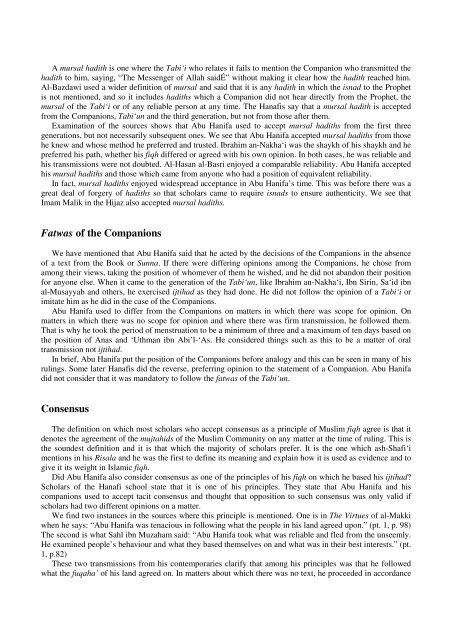Create successful ePaper yourself
Turn your PDF publications into a flip-book with our unique Google optimized e-Paper software.
A mursal hadith is one where the Tabi‘i who relates it fails to mention the Companion who transmitted the<br />
hadith to him, saying, “The Messenger of Allah saidÉ” without making it clear how the hadith reached him.<br />
Al-Bazdawi used a wider definition of mursal <strong>and</strong> said that it is any hadith in which the isnad to the Prophet<br />
is not mentioned, <strong>and</strong> so it includes hadiths which a Companion did not hear directly from the Prophet, the<br />
mursal of the Tabi‘i or of any reliable person at any time. The Hanafis say that a mursal hadith is accepted<br />
from the Companions, Tabi‘un <strong>and</strong> the third generation, but not from those after them.<br />
Examination of the sources shows that <strong>Abu</strong> <strong>Hanifa</strong> used to accept mursal hadiths from the first three<br />
generations, but not necessarily subsequent ones. We see that <strong>Abu</strong> <strong>Hanifa</strong> accepted mursal hadiths from those<br />
he knew <strong>and</strong> whose method he preferred <strong>and</strong> trusted. Ibrahim an-Nakha‘i was the shaykh of his shaykh <strong>and</strong> he<br />
preferred his path, whether his fiqh differed or agreed with his own opinion. In both cases, he was reliable <strong>and</strong><br />
his transmissions were not doubted. Al-Hasan al-Basri enjoyed a comparable reliability. <strong>Abu</strong> <strong>Hanifa</strong> accepted<br />
his mursal hadiths <strong>and</strong> those which came from anyone who had a position of equivalent reliability.<br />
In fact, mursal hadiths enjoyed widespread acceptance in <strong>Abu</strong> <strong>Hanifa</strong>’s time. This was before there was a<br />
great deal of forgery of hadiths so that scholars came to require isnads to ensure authenticity. We see that<br />
<strong>Imam</strong> Malik in the Hijaz also accepted mursal hadiths.<br />
Fatwas of the Companions<br />
We have mentioned that <strong>Abu</strong> <strong>Hanifa</strong> said that he acted by the decisions of the Companions in the absence<br />
of a text from the Book or Sunna. If there were differing opinions among the Companions, he chose from<br />
among their views, taking the position of whomever of them he wished, <strong>and</strong> he did not ab<strong>and</strong>on their position<br />
for anyone else. When it came to the generation of the Tabi‘un, like Ibrahim an-Nakha‘i, Ibn Sirin, Sa‘id ibn<br />
al-Musayyab <strong>and</strong> others, he exercised ijtihad as they had done. He did not follow the opinion of a Tabi‘i or<br />
imitate him as he did in the case of the Companions.<br />
<strong>Abu</strong> <strong>Hanifa</strong> used to differ from the Companions on matters in which there was scope for opinion. On<br />
matters in which there was no scope for opinion <strong>and</strong> where there was firm transmission, he followed them.<br />
That is why he took the period of menstruation to be a minimum of three <strong>and</strong> a maximum of ten days based on<br />
the position of Anas <strong>and</strong> ‘Uthman ibn Abi’l-‘As. He considered things such as this to be a matter of oral<br />
transmission not ijtihad.<br />
In brief, <strong>Abu</strong> <strong>Hanifa</strong> put the position of the Companions before analogy <strong>and</strong> this can be seen in many of his<br />
rulings. Some later Hanafis did the reverse, preferring opinion to the statement of a Companion. <strong>Abu</strong> <strong>Hanifa</strong><br />
did not consider that it was m<strong>and</strong>atory to follow the fatwas of the Tabi‘un.<br />
Consensus<br />
The definition on which most scholars who accept consensus as a principle of Muslim fiqh agree is that it<br />
denotes the agreement of the mujtahids of the Muslim Community on any matter at the time of ruling. This is<br />
the soundest definition <strong>and</strong> it is that which the majority of scholars prefer. It is the one which ash-Shafi‘i<br />
mentions in his Risala <strong>and</strong> he was the first to define its meaning <strong>and</strong> explain how it is used as evidence <strong>and</strong> to<br />
give it its weight in Islamic fiqh.<br />
Did <strong>Abu</strong> <strong>Hanifa</strong> also consider consensus as one of the principles of his fiqh on which he based his ijtihad?<br />
Scholars of the Hanafi school state that it is one of his principles. They state that <strong>Abu</strong> <strong>Hanifa</strong> <strong>and</strong> his<br />
companions used to accept tacit consensus <strong>and</strong> thought that opposition to such consensus was only valid if<br />
scholars had two different opinions on a matter.<br />
We find two instances in the sources where this principle is mentioned. One is in The Virtues of al-Makki<br />
when he says: “<strong>Abu</strong> <strong>Hanifa</strong> was tenacious in following what the people in his l<strong>and</strong> agreed upon.” (pt. 1, p. 98)<br />
The second is what Sahl ibn Muzaham said: “<strong>Abu</strong> <strong>Hanifa</strong> took what was reliable <strong>and</strong> fled from the unseemly.<br />
He examined people’s behaviour <strong>and</strong> what they based themselves on <strong>and</strong> what was in their best interests.” (pt.<br />
1, p.82)<br />
These two transmissions from his contemporaries clarify that among his principles was that he followed<br />
what the fuqaha’ of his l<strong>and</strong> agreed on. In matters about which there was no text, he proceeded in accordance














